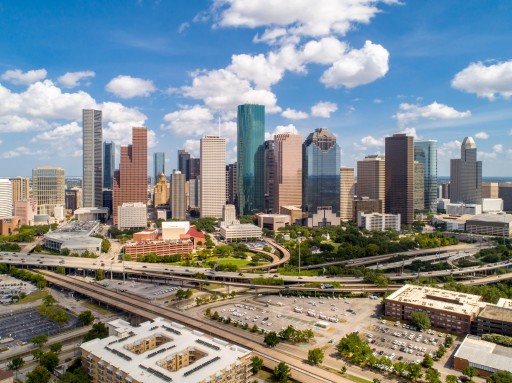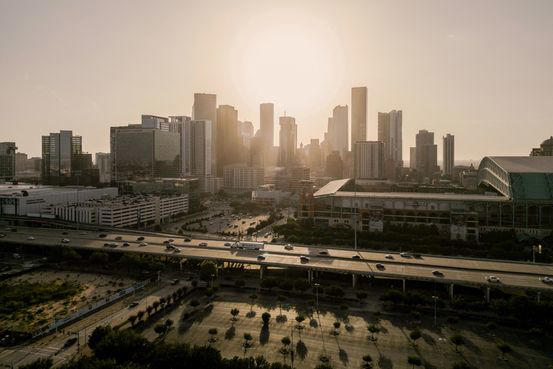HOUSTON—Houstonians pride themselves on how they tolerate heat. This summer, the heat has become intolerable.
Businesses and residents in America’s fourth-largest city have moved much of life indoors, changing work and spending habits. Some residents say they are reminded of quarantining during the pandemic’s early days: ordering in groceries, avoiding social commitments and looking for ways to stay entertained from the couch.
“This year is different, people are staying home,” said Barbara Stewart, a professor of human development and consumer sciences at the University of Houston.
At Buffalo Bayou Brewing, a taproom and restaurant in the Heights neighborhood, fewer people are coming to the restaurant during the day, said Jonathan Horowitz, chief revenue and strategy officer. Earlier this month, the restaurant purchased two new portable cooling units to put behind the rooftop deck’s bar to better keep staff cool.
He estimates revenue during the heat wave is down roughly 10% compared with the same time in 2022.
“It seems like the time frame of this kind of heat has expanded beyond what it used to be,” Horowitz said. “We always had 100-degree days, but when you have 100-degree days for two months straight, that’s different.”
Employees at small- and medium-size businesses in the tourism, arts and entertainment and sports and recreation industries in Texas averaged 19.6 hours on the job a week between mid-June and mid-July, a 20% decline from the average during comparable weeks from 2019 to 2022, according to an analysis from Luke Pardue, an economist at payroll platform Gusto.
If the weather pattern so far this summer continues through August, Texas’ gross state product this year will be reduced by roughly $9.5 billion, a 0.47% lower growth rate, according to Ray Perryman, an economist and president at the economic research and analysis firm the Perryman Group. That estimate assumes average temperatures in the state this summer will be roughly 2.6 degrees above the long-term average since 1900, Perryman said.
Samuel Westry, a real-estate agent in the greater Houston area, said some of his clients have been reluctant to attend property showings in person. Technology, such as virtual visits, have helped business continue, but it is harder to get people to buy without a face-to-face visit, he said.
The weather has also made it tough to look presentable.
“God forbid the air conditioner is out at a house that I’m showing or the electricity is off,” he joked, adding that he has been keeping an emergency towel and deodorant in the car.
Darrell Ard owns the West Montgomery Auto Repair shop in the Northside neighborhood. He said he has been slammed with Freon top-offs and air-conditioner repairs.
While many of his customers previously put off the expense of a fix for weeks or months to save up, “now they’re going to jump right on it,” said Ard, who started the business five years ago.
A 2019 research paper found that, on average, each one-degree Fahrenheit increase in the mean summer temperature in the U.S. leads to a 0.154 percentage-point decrease in the annual growth rate of gross state product. The decline is roughly double in Southern states, such as Texas, said Bridget Hoffmann, an economist at the Inter-American Development Bank and one of the paper’s co-authors.
Hoffmann and co-authors also found that higher summer temperatures negatively affect output growth in a range of industries, including agriculture, construction, finance and insurance, while boosting it in the utilities and mining industries.
The negative impact shows that “moving towards a service economy and moving some of your economy out of agriculture isn’t enough to insulate your economy,” Hoffmann said.
The Houston Health Department has given out air conditioners and set up manned cooling centers so people without air conditioning can take refuge from the heat. Danny Perez, a spokesman for the Texas Department of Transportation, said the heat had caused two road buckles and some pavement failures in the Houston area. The cost to the state to repair the road buckles totaled roughly $400,000, according to data provided by Perez.
The Electric Reliability Council of Texas, which manages the state’s electrical grid and in recent years struggled to perform during severe weather events, said peak energy demand has reached new highs five times so far this summer. Most recently, peak demand reached 82,592 megawatts on July 18, compared with the record before this summer of 80,148 megawatts in July 2022.
At Aire Serv of River Oaks, co-owner Hector Jimenez said service requests are up about 12% from this time last year. “We’re stretched to capacity,” he said.
The company has struggled to retain technicians as the prospect of working in blistering sun and 110-degree-plus attics collides with a shortage of skilled workers.
Repairs can run from a few hundred to a few thousand dollars, while new HVAC systems retail from $7,900 all the way to $18,000-plus. Across the U.S., HVAC repairs are 28% more expensive on average as of last month than they were in June 2021, rising to $1,401, according to data from management software firm Jobber.
Miguel Jimenez, whose parents own Aire Serv, said he is working 10- to 12-hour days with few days off. “A lot of people are counting on me,” he said.
On a recent Thursday in the East End neighborhood, the younger Jimenez fixed a leaking unit for the Blanding family, who was hunkered down in the living room with the curtains drawn.
“I usually enjoy the quiet and stillness of summer, but I don’t want to be here anymore,” said Benjamin Blanding, a 42-year-old math professor at San Jacinto College, who grew up just outside the city.
The family postponed a coming vacation to Goose Island State Park when they saw the heat index would reach 108 degrees. And they bailed on a visit to the public pool after less than an hour when the water felt hotter than the air.
Eleven-year-old Leila Blanding, who spent that morning reading, said she misses being able to go down to the bayou by the house and out skateboarding with her friends. “It can get boring,” she said.
After delivering the Blandings their $600 bill, Jimenez hopped back in the car for a quick unit tuneup at an Airbnb where Alvin Moore was staying. A lifelong Southerner, the 27-year-old Moore had planned to spend his time in Houston enjoying the golf courses and soccer fields.
Lately, he has been hard-pressed to find anyone willing to play.
“The course is mostly empty,” he said.







